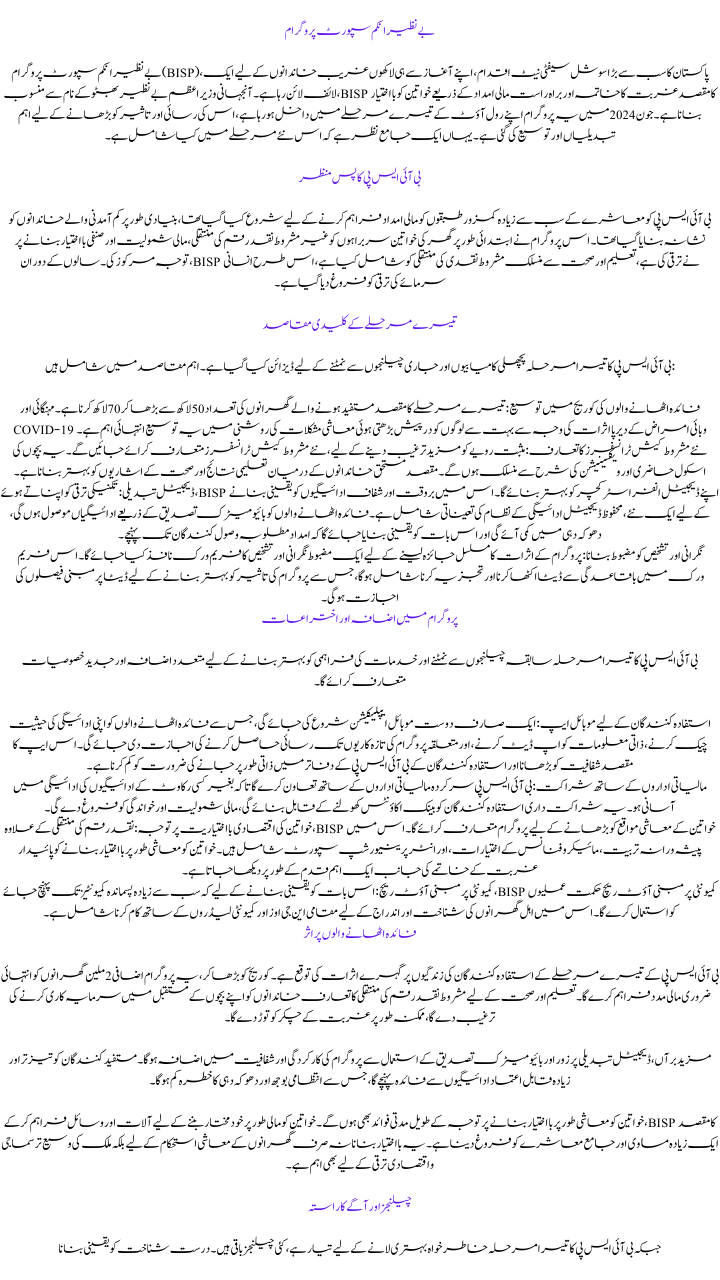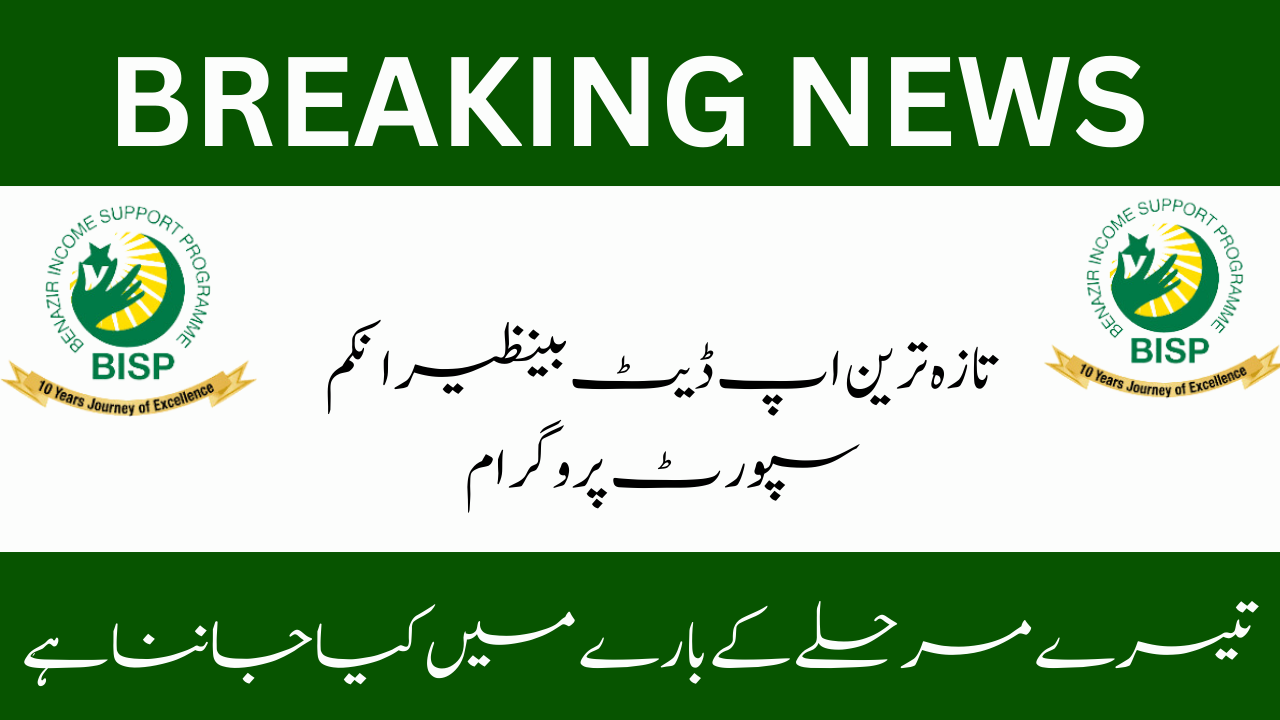Benazir Income Support Program
The Benazir Income Support Program (BISP), Pakistan’s flagship social safety net initiative, has been a lifeline for millions of impoverished families since its inception. Named after the late Prime Minister Benazir Bhutto, BISP aims to alleviate poverty and empower women through direct financial assistance. As the program enters its third phase of rollout in June 2024, significant changes and expansions are set to enhance its reach and effectiveness. Here’s a comprehensive look at what this new phase entails.
Background of BISP
BISP was launched to provide a financial cushion to the most vulnerable segments of society, primarily targeting low-income families. The program initially focused on unconditional cash transfers to female heads of households, promoting financial inclusivity and gender empowerment. Over the years, BISP has evolved, incorporating conditional cash transfers linked to education and health, thereby fostering human capital development.
Key Objectives of the Third Phase
The third phase of BISP is designed to build on previous successes and address ongoing challenges. The main objectives include:
- Expansion of Beneficiary Coverage: The third phase aims to increase the number of beneficiary households from 5 million to 7 million. This expansion is crucial in light of the growing economic hardships faced by many due to inflation and the lingering effects of the COVID-19 pandemic.
- Introduction of New Conditional Cash Transfers: To further incentivize positive behavior, new conditional cash transfers will be introduced. These will be linked to children’s school attendance and vaccination rates. The goal is to improve educational outcomes and health indicators among beneficiary families.
- Digital Transformation: Embracing technological advancements, BISP will enhance its digital infrastructure. This includes the deployment of a new, secure digital payment system to ensure timely and transparent disbursements. Beneficiaries will receive payments through biometric verification, reducing fraud and ensuring that aid reaches the intended recipients.
- Strengthening Monitoring and Evaluation: A robust monitoring and evaluation framework will be implemented to assess the program’s impact continuously. This framework will involve regular data collection and analysis, allowing for data-driven decisions to improve program effectiveness.
Program Enhancements and Innovations
The third phase of BISP will introduce several enhancements and innovative features to address previous challenges and improve service delivery:
- Mobile App for Beneficiaries: A user-friendly mobile application will be launched, allowing beneficiaries to check their payment status, update personal information, and access relevant program updates. This app aims to increase transparency and reduce the need for beneficiaries to visit BISP offices in person.
- Partnership with Financial Institutions: BISP will collaborate with leading financial institutions to facilitate seamless payment disbursements. This partnership will also enable beneficiaries to open bank accounts, promoting financial inclusion and literacy.
- Focus on Women’s Economic Empowerment: Beyond cash transfers, BISP will introduce programs to enhance women’s economic opportunities. This includes vocational training, microfinance options, and entrepreneurship support. Empowering women economically is seen as a critical step toward sustainable poverty alleviation.
- Community-Based Outreach: To ensure that the most marginalized communities are reached, BISP will employ community-based outreach strategies. This includes working with local NGOs and community leaders to identify and enroll eligible households.
Impact on Beneficiaries
The third phase of BISP is expected to have a profound impact on the lives of its beneficiaries. By expanding coverage, the program will provide much-needed financial support to an additional 2 million households. The introduction of conditional cash transfers for education and health will encourage families to invest in their children’s future, potentially breaking the cycle of poverty.
Moreover, the emphasis on digital transformation and the use of biometric verification will enhance the efficiency and transparency of the program. Beneficiaries will benefit from faster and more reliable payment disbursements, reducing the administrative burden and the risk of fraud.
The focus on women’s economic empowerment will also have significant long-term benefits. By providing women with the tools and resources to become financially independent, BISP aims to foster a more equitable and inclusive society. This empowerment is not only crucial for the economic stability of households but also for the broader socio-economic development of the country.
Challenges and the Way Forward
While the third phase of BISP is poised to bring about substantial improvements, several challenges remain. Ensuring the accurate identification and enrollment of eligible households is a complex task that requires robust data management and verification processes. Additionally, the program must address potential issues related to digital literacy among beneficiaries, particularly in rural areas.

To overcome these challenges, BISP will invest in capacity building for its staff and partners, ensuring they are equipped with the necessary skills and knowledge. Continuous stakeholder engagement, including feedback from beneficiaries, will be crucial to refining and improving the program.
Furthermore, sustained political and financial support from the government is essential to maintain the program’s momentum. BISP’s success depends on the commitment of policymakers to prioritize social protection and allocate sufficient resources.
Conclusion
The third phase of the Benazir Income Support Program represents a significant step forward in Pakistan’s efforts to combat poverty and promote social justice. By expanding coverage, introducing innovative features, and focusing on women’s empowerment, BISP aims to create a more inclusive and equitable society. While challenges remain, the program’s comprehensive approach and commitment to continuous improvement provide a solid foundation for achieving its ambitious goals. As BISP rolls out its third phase in June 2024, millions of vulnerable families across Pakistan can look forward to a brighter and more secure future.
